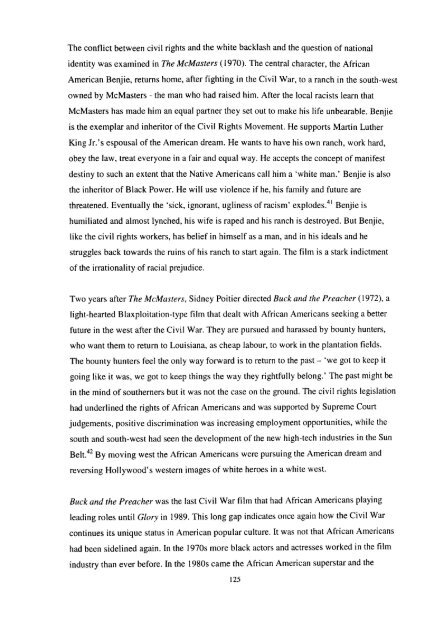Download (3483kB) - Greenwich Academic Literature Archive ...
Download (3483kB) - Greenwich Academic Literature Archive ...
Download (3483kB) - Greenwich Academic Literature Archive ...
- No tags were found...
You also want an ePaper? Increase the reach of your titles
YUMPU automatically turns print PDFs into web optimized ePapers that Google loves.
The conflict between civil rights and the white backlash and the question of nationalidentity was examined in The McMasters (1970). The central character, the AfricanAmerican Benjie, returns home, after fighting in the Civil War, to a ranch in the south-westowned by McMasters - the man who had raised him. After the local racists learn thatMcMasters has made him an equal partner they set out to make his life unbearable. Benjieis the exemplar and inheritor of the Civil Rights Movement. He supports Martin LutherKing Jr.'s espousal of the American dream. He wants to have his own ranch, work hard,obey the law, treat everyone in a fair and equal way. He accepts the concept of manifestdestiny to such an extent that the Native Americans call him a 'white man.' Benjie is alsothe inheritor of Black Power. He will use violence if he, his family and future arethreatened. Eventually the 'sick, ignorant, ugliness of racism' explodes. 41 Benjie ishumiliated and almost lynched, his wife is raped and his ranch is destroyed. But Benjie,like the civil rights workers, has belief in himself as a man, and in his ideals and hestruggles back towards the ruins of his ranch to start again. The film is a stark indictmentof the irrationality of racial prejudice.Two years after The McMasters, Sidney Poitier directed Buck and the Preacher (1972), alight-hearted Blaxploitation-type film that dealt with African Americans seeking a betterfuture in the west after the Civil War. They are pursued and harassed by bounty hunters,who want them to return to Louisiana, as cheap labour, to work in the plantation fields.The bounty hunters feel the only way forward is to return to the past - 'we got to keep itgoing like it was, we got to keep things the way they rightfully belong.' The past might bein the mind of southerners but it was not the case on the ground. The civil rights legislationhad underlined the rights of African Americans and was supported by Supreme Courtjudgements, positive discrimination was increasing employment opportunities, while thesouth and south-west had seen the development of the new high-tech industries in the SunBelt.42 By moving west the African Americans were pursuing the American dream andreversing Hollywood's western images of white heroes in a white west.Buck and the Preacher was the last Civil War film that had African Americans playingleading roles until Glory in 1989. This long gap indicates once again how the Civil Warcontinues its unique status in American popular culture. It was not that African Americanshad been sidelined again. In the 1970s more black actors and actresses worked in the filmindustry than ever before. In the 1980s came the African American superstar and the125
















